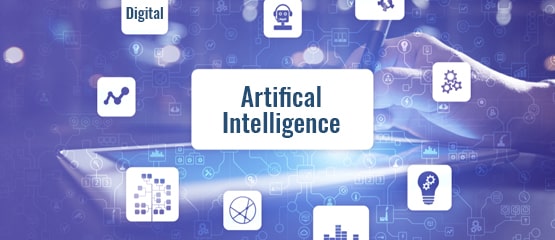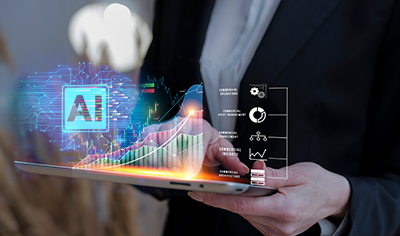Voice Assistant. Chatbots. Self-driving cars. What do these programs or services have in common? That Artificial Intelligence powers them— now considered a real-world game-changer technology.
AI has steadily evolved from a symbolic character in science allegories to a real-world game-changer technology. Today, AI-based tools are being adopted across different industries, thanks to the two biggest USPs it offers— the exponential increase in computing capabilities and the proliferation of data from multiple realms. This has catapulted a wave where organizations leverage AI tools to adapt to new challenges and solve the existing ones more efficiently.
As per a survey by PWC conducted among Global CEOs, 8 out of 10 CEOs agreed that Artificial Intelligence is bound to change the way businesses operate in the next five years, irrespective of whether they adopt it.
Banking on Artificial Intelligence development, diverse industries have found new ways of operating, optimizing costs, innovating new products or services, and streamlining the delivery of existing offerings. This paradigm shift has been primarily brought about through AI-derived insights and the institutionalized data-driven culture in organizations. Moreover, accelerated adoption of peer technologies such as Automation, Cloud Computing, and Data Mining has facilitated building a tech ecosystem for bracing challenges of tomorrow.
A survey conducted by Gartner among global CIOs revealed that between 2018 and 2019, the number of organizations that have deployed AI-based solutions grew from 4% to 14%, and Conversational AI remains at the top of corporate agendas.
Now that a sizable number of organizations have graduated from the initial phase in Artificial Intelligence development to stabilized AI-augmented processes registering positive ROI, more and more businesses are turning to AI development companies. Therefore, many organizations have begun to stake up their processes with streamlined data management and enhanced computing capabilities to adopt AI-based tools. This prepping for AI has helped organizations realize plenty of opportunities, and many have just begun the ascent.
In a survey conducted by McKinsey, companies that have adopted AI registered an increase in revenue and a 44% reduction in cost. While AI-powered success stories are abundant with divergent use-cases, the end goals have been accelerating product development and personalized service delivery. The key-enablers driving AI-led business transformation revolves around three major themes:
1. Predictive insights for decision-makers
As we all know, generally, the C-suite needs to deal with the exceedingly difficult task of making the decisions for the whole organization. In the era of disruption when the waters are murky with multifactorial problems at play, AI-based solutions help decision-makers arrive at data-backed insights. Especially when data space is enormous for any traditional analytics method to sift through, the Machine Learning models facilitate insights uncovering patterns that we didn’t know existed.
For example, AI-powered predictive analytics has enabled Manufacturing companies to predict demand and calibrate their raw material supply accordingly.

Another good use case is from the Financial Services industry leveraging AI development services to gauge the future market for efficient portfolio management, predict asset performance through historical data, and roll personalized products.
2. Customer engagement across multiple channels
Customer engagement strategy has seen probably the most significant structural shift due to AI. As per a news feature by Microsoft, in five years from now, 95 percent of all customer interactions would be relayed through channels supported by AI. There has been a surge in AI-powered tools that identify the patterns of services consumption, purchase history, and media preference to serve customers a highly-personalized content and product inventory. Personalization of offerings addresses their needs and nurtures them through the customer journey.
The ECommerce industry has already started to benefit from personalized recommendations generated through complex AI algorithms. The merger of omnichannel consumer data, real-time insights, and search context is churning relevant suggestions to consumers. It helps increase time spent on the platform and, in the end, what all the businesses work for- enhance purchases.
3. Collaborative and Streamlined workflows
The historic challenge of most industries has been a lack of synchronization between different processes. When the functions operate in silos, workers spend a substantial time searching for the information they need to do the actual work. As per a study by McKinsey, improving communication and collaboration among teams can yield a productivity increase of 20 to 25 percent.

IaaS (Integration as a Service) model has enabled AI tools to automatically surface the required information at the right time, irrespective of the worker’s location, the platform they are using, and the app they are currently working on.
The most common enterprise project that AI development services are working on is building tools that intelligently interpret the employee’s intention and populate the information they might need in close conjunction with the current query.
Bottom Line
As more and more successful AI use-cases surface with statistically significant increment in ROI, an increasing number of organizations, including small businesses, are contemplating deploying AI. Moreover, several AI development companies have come up with ready-to-integrate AI-enabled accelerators to shorten the development time. In a nutshell, the trend to use Artificial Intelligence will become a norm, an essential technology for businesses across domains.





